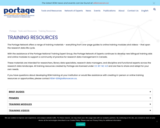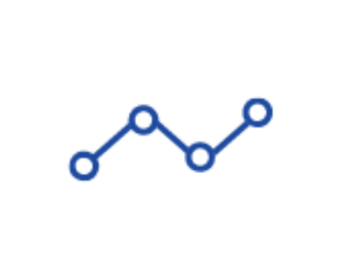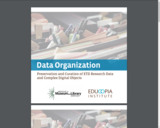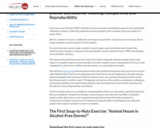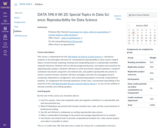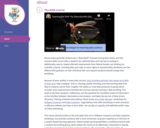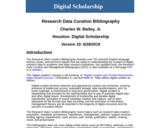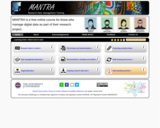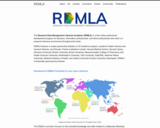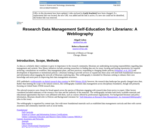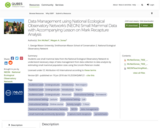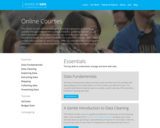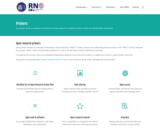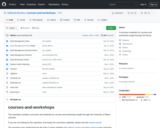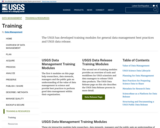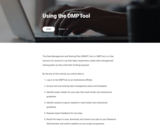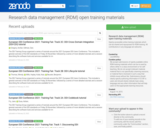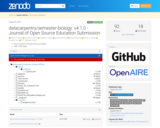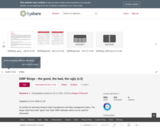This version of this teaching module was published in Teaching Issues and Experiments in Ecology:
Jim McNeil and Megan A. Jones. April 2018, posting date. Data Management using National Ecological Observatory Network’s (NEON) Small Mammal Data with Accompanying Lesson on Mark Recapture Analysis. Teaching Issues and Experiments in Ecology, Vol. 13: Practice #9 [online]. http://tiee.esa.org/vol/v13/issues/data_sets/mcneil/abstract.html
*** *** ***
Undergraduate STEM students are graduating into professions that require them to manage and work with data at many points of a data management life cycle. Within ecology, students are presented not only with many opportunities to collect data themselves, but increasingly to access and use public data collected by others. This activity introduces the basic concept of data management from the field through to data analysis. The accompanying presentation materials mention the importance of considering long-term data storage and data analysis using public data.
This data set is a subset of small mammal trapping data from the National Ecological Observatory Network (NEON). The accompanying lesson introduces students to proper data management practices including how data moves from collection to analysis. Students perform basic spreadsheet tasks to complete a Lincoln-Peterson mark-recapture calculation to estimate population size for a species of small mammal. Pairs of students will work on different sections of the datasets allowing for comparison between seasons or, if instructors download additional data, between sites and years. Data from six months at NEON’s Smithsonian Conservation Biology Institute (SCBI) field site are included in the materials download. Data from other years or locations can be downloaded directly from the NEON data portal to tailor the activity to a specific location or ecological topic.
In this activity, students will:
- discuss data management practices with the faculty. Presentation slides are provided to guide this discussion.
- view field collection data sheets to understand how organized data sheets can be constructed.
- design a spreadsheet data table for transcription of field collected data using good data management practices.
- view NEON small mammal trapping data to a) see a standardized spreadsheet data table and b) see what data are collected during NEON small mammal trapping.
- use Microsoft Excel or Google Sheets to conduct a simple Lincoln-Peterson Mark-Recapture analysis to estimate plot level species population abundance.
Please note that this lesson was developed while the NEON project was still in construction. There may be future changes to the format of collected and downloaded data. If using data directly from the NEON Data Portal instead of using the data sets accompanying this lesson, we recommend testing out the data each year prior to implementing this lesson in the classroom.
This module was originally taught starting with a field component where students accompanied NEON technicians during the small mammal trapping. As this is not a possibility for most courses, the initial part of the lesson has been modified to include optional videos that instructors can use to show how small mammal trapping is conducted. Instructors are also encouraged to bring small mammal traps and small mammal specimens into the classroom where available.
The Data Sets
The National Ecological Observatory Network is a program sponsored by the National Science Foundation and operated under cooperative agreement by Battelle Memorial Institute. This material is based in part upon work supported by the National Science Foundation through the NEON Program.
The following datasets are posted for educational purposes only. Data for research purposes should be obtained directly from the National Ecological Observatory Network (www.neonscience.org).
Data Citation: National Ecological Observatory Network. 2017. Data Product: NEON.DP1.10072.001. Provisional data downloaded from http://data.neonscience.org. Battelle, Boulder, CO, USA
Notes
Version 2.1: Includes correct Lincoln-Peterson Index formula in PPT, faculty, and student notes.
Version 2.0: This version of the teaching module was published in Teaching Issues and Experiments in Ecology. McNeil and Jones 2018. This version reflects updates based on comments from reviewers.
Version 1.0: This version of the teaching module was prepared as part of the 2017 DIG FMN. It was submitted for publication as part of the DIG Special Issue of TIEE.
Cite this work
Researchers should cite this work as follows:
Jim McNeil, Megan A. Jones (2018). Data Management using National Ecological Observatory Network's (NEON) Small Mammal Data with Accompanying Lesson on Mark Recapture Analysis. NEON - National Ecological Observatory Network, (Version 2.1). QUBES Educational Resources. doi:10.25334/Q4M121
